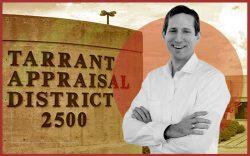It’s starting to feel prophetic that ‘Texas’ is an anagram for ‘taxes.’
On Thursday, the Texas House Ways and Means Committee gathered to discuss one of the biggest issues in the state: property taxes.
A number of big personalities from all over the state traveled to Austin to testify about what they see as a broken system riddled with loopholes. However, at the end of the nine hour session, committee members weren’t any closer to finding a solution to the issue plaguing their homeowning constituents.
About two hours into the hearing, attorney Alex Fairly took the floor and opened his testimony by commending the committee members for all the work they do, “as a regular guy, taxpayer, I don’t know what you guys do to pay the bills, ‘cause it’s probably not this job.”
Fairly is in an ongoing lawsuit against his hometown of Amarillo over what he sees as a severe abuse of government power that’s resulted in a huge burden for property tax payers. In short, the city of Amarrillo “squeezed” money through Texas Local Government Code Chapter 1431 to fund a civic center. In November 2020, Amarillo voted against the $275 million bond package that would have covered the civic center and by a “pretty significant margin,” Fairly adds. Undeterred, the city spent the entirety of 2021 seeking a private partnership to fund the project, but to no avail.
Earlier this year, they found a solution: anticipation notes. The city conjured up the largest anticipation note in the history of Texas—$260 million— by four times. For context, Amarillo is the 14th largest market in the state. Now, the burden of this debt has primarily fallen on homeowners in the form of huge property tax hikes with some taxpayers seeing upwards of a 100 percent increase.
“As a taxpayer and a citizen, it just seemed like, ‘really? After everyone says no, you can just do this?” Fairly said. “There’s no recourse by taxpayers for anticipation notes.”
Fairly believes that what happened in Amarillo affects the whole state. “The spirit of Chapter 1431 needs to be addressed,” he says, adding that the alleged abuse of this loophole could provide a “roadmap” for the rest of the state to do the same.
“Do you have a suggestion, Mr. Fairly, of what we oughta do?” Rep. Bobby Guerra asked in response. Cities and counties across the state of Texas have all been poking and prodding their tax codes and budgets to address this existential question. Moreover, they’ve all been trying to figure out how to balance being a tax haven and having a functional state.
Read more


“This comes at a cost and that’s what I’m trying to get people to understand,” Mayor David Billings of Fate, TX testified. “We need to find a balance between taxes and quality of services, quality of life.”
Billings said the number one request he gets concerns property taxes. He said he’s tried to relieve the burden on the elderly as much as possible, but finds a problem in finding the funding for basic public services like police, firefighters and road maintenance.
Of course, a hearing about property taxes in Texas wouldn’t be complete without Chandler Crouch. Crouch gained notoriety this year when the Tarrant County Appraisal District launched a complaint that he was making a “mockery of the current tax system.” Over the past two years, he had been helping homeowners pro bono to file 90,000 appraisal protests against Tarrant County. Crouch has since been cleared and the two city officials behind the complaint were suspended.
Crouch further drove home the issue of transparency and accountability.
“The reason why this has reached a fever pitch is because of the tax bills that came in April,” he said, “The value of their home is completely divorced from their ability to pay.”
He went on to describe a system wherein elected officials and the unelected appraisers have been tossing the responsibility back and forth. Fittingly, Chairman Rep. Morgan Meyer responded by saying he sees the appraisal office as an extension of the comptroller’s office and that’s where the responsibility lies. He also stressed that the issue is only going to get worse unless decisive action is taken.
“If you think we have a problem now just wait until values drop or plateau,” he said. “People are gonna lose their minds.”
